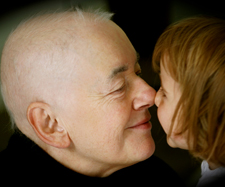The diagnosis of a chronic or terminal illness instantly changes the way we see and live our lives. We are impacted on all levels—physical, emotional, spiritual and psychological. There can also be a financial loss if the illness limits our ability to work.
How do we get through such a frightening and overwhelming transformation of our whole being? Each of us will respond differently and will find our own way to cope. There is no right or wrong way.
A chronic illness refers to a group of health conditions that are long-lasting. Chronic illnesses can often be managed through a careful regimen of diet, exercise and medication. A terminal illness is one that is considered to be life-threatening. Some have long gradual declines while others have patterns of remission and relapse. Some are unpredictable.
The five stages of grief
When faced with a chronic or terminal illness, we naturally go through five stages of psychological adjustment. There is no set time frame for moving through these phases and often they overlap or happen simultaneously. The stages include:
Denial. You experience shock and confusion about the diagnosis. You are not ready to acknowledge the loss of your good health and the possibility of a major illness, therefore your mind instinctively denies the illness.
Anger. You are angry that this is happening that you are losing control of your body and health. The anger might be directed toward anyone—yourself, your family, friends, colleagues, doctors, strangers, even God. Asking yourself, “Why me?” is a natural question at this stage.
Depression. You feel grief and sorrow. You mourn the loss of your health, your mobility, your family, friends and your future plans. You feel intense sadness and despair.
Bargaining. In an attempt to change your reality, you try to negotiate around the illness. Typical responses at this stage include: "If I start to take better care of myself, maybe this will go away," or, "If God grants me my health, I will spend more time helping others."
Acceptance. You begin to accept the illness as part of your reality and are more open to learning about its symptoms and treatment. You are learning to cope with the huge physical impact of the illness as well as the many changes it has made in your life.
How to cope
When you or someone you know has been diagnosed with a chronic or terminal illness, know that you are not alone. Here are some helpful coping tips for you and your loved ones who may be affected by this situation:
Reach out to family and friends. They will be your most loving, nurturing and helpful supports.
Take responsibility for your health. Learn about your condition, what to expect and the treatment options available to you. Get a second opinion if necessary.
Have a family member go with you to medical appointments to help you with questions or to jot down important information. You will be highly emotional and may not remember or be able to take in all the information that you are given.
Find out about other supports such as assistive devices and home services that can provide you with necessary help, should you need it.
Discuss holistic supports with your doctor, such as massage therapy, aromatherapy, acupuncture, etc. These can be helpful for symptom relief and stress management during your difficult time.
Set realistic boundaries for yourself—recognize what you can and cannot do, and try not to over exert yourself. Listen to your mind, body and spirit.
Try to live in the here and now—find pleasure and contentment in the simple aspects of your life such as music, nature, reading, walks. Do more of what you love rather than what you must or should do.
Try to remain positive and hopeful. Think back to the joys and accomplishments of your life.
Realize that you are a unique individual with many characteristics. The illness is only one part of you; it’s not the total you.
To cope with a serious condition, and to make room for treatment to be as effective as possible, it’s important to work through the stages described, in whatever order they occur. Reach out for professional help especially if you are struggling with your reactions and are finding it difficult to move ahead with your care.
Understand that it is normal to experience a roller coaster of emotions when faced with a chronic or life threatening illness. There are many wonderful support groups that understand what you are going through and can provide you with assistance.